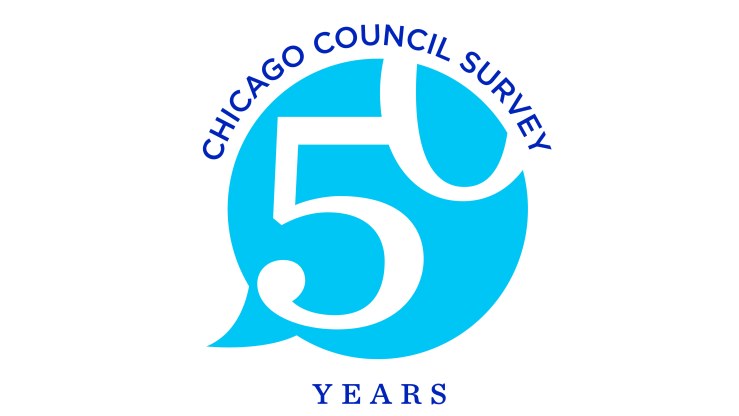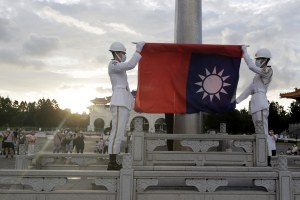Should China invade, Americans support arming Taipei but oppose direct military intervention.
Since the United States switched official diplomatic recognition from the Republic of China (the legal name for Taiwan’s government) to the People’s Republic of China in 1979, America has maintained a robust yet unofficial relationship with Taipei. As tensions rise across the Taiwan Strait, and between Beijing and Washington, that relationship in all its complexities has been thrust into the international spotlight.
A series of surveys conducted by the Chicago Council on Global Affairs, including the annual 2024 Chicago Council Survey, find that Americans have generally warm views of Taiwan, favor Taiwan’s inclusion in international organizations, and would support recognizing Taiwan as an independent country. But there are limits: Americans are unwilling to commit US troops to the defense of Taiwan and would oppose direct US involvement in a military conflict between Taipei and Beijing. Perhaps for this reason, Americans say the United States should push Taiwan to maintain the status quo rather than seek independence or unification.
Key Findings
- A narrow majority of Americans (51%) say the United States should encourage Taiwan to maintain the status quo rather than move toward independence (36%) or unification (4%).
- Should China invade Taiwan, Americans support a range of policies to aid Taiwan, including airlifts of supplies (74%) and providing arms to Taipei (59%) but oppose putting US forces into a position that could lead to war with China (58% oppose).
- While a minority of Americans (42%) favor committing to defend Taiwan from China, majorities support Taiwan’s inclusion in international organizations (59%) and favor a US-Taiwan free trade agreement (62%).
Americans Hold Positive Views of Taiwan and US-Taiwan Security Relations
Over the past two decades, American views of Taiwan have slowly warmed. On the Council’s feeling thermometer, on which a zero represents a very cold, unfavorable feeling and 100 a very warm, favorable feeling, Taiwan receives an average score of 58, similar to the 60 it received in 2022 and up from the average of 50 it received throughout the 1980s and ’90s. Those favorable views of Taiwan are also held across party lines, though this is somewhat less true today than it was two years ago. As August 2024 Council-Ipsos polling shows, Democrats (62) are now more likely than Republicans (54) to feel warmly toward Taiwan, while Independents (58) fall in the middle.
American views on the impact of the US-Taiwan security relationship for US national security reflects the same combination of overall positive views with slight partisan differences. Overall, six in 10 Americans say the US-Taiwan security relationship does more to strengthen US national security (62%) than to weaken it (32%). Here too views are positive across the partisan spectrum, though Democrats (67%) are slightly more positive than Republicans (62%) and Independents (58%).
Americans Generally Favor Supporting Taiwan’s International Position
Matching these generally positive views of Taiwan, majorities of Americans favor a range of pro-Taiwan policies. These include supporting Taiwan’s inclusion in international organizations such as the United Nations or the World Health Organization (62% favor) and signing a US-Taiwan free trade agreement (59% favor). Six in 10 Americans also favor recognizing Taiwan as an independent country (61%)—but as other data shows, support for a pro-independence position drops sharply once the potential of a Chinese retaliatory invasion is brought to the fore.
Notably, there is little opposition to these policies—but many Americans (between 27% and 42%) say they are not sure whether to favor or oppose them. In fact, as many Americans are not sure whether the United States should commit to defend Taiwan from invasion as support making that commitment.
American opinion on US-Taiwan policy is also largely bipartisan. Majorities of Democrats, Republicans, and Independents all support efforts by the United States to support Taiwan’s inclusion in international organizations, favor the United States recognizing Taiwan as an independent country, and back a US-Taiwan free trade agreement. Democrats are somewhat more inclined to support Taiwan through international organizations and trade, while Independents are somewhat less inclined to support any of the proposed policies. Views are also similar across party lines when it comes to committing the United States to defend Taiwan from an invasion by China. This includes a plurality of Republicans (46%, 37% say they are not sure and 15% oppose such a commitment), while Democrats and Independents are divided between four in 10 who favor doing so (43% Democrats, 39% Independents) and a similar proportion who are not sure (45% Democrats, 44% Independents).
American Reactions to an Invasion of Taiwan: Aid without US Military Action
In keeping with the public’s general esteem for the US-Taiwan relationship, Americans favor a variety of steps to aid Taiwan should China invade the island. As they have in past years, Americans support providing food and medical supplies (74%) and military aid (59%) to Taiwan and would favor imposing economic and diplomatic sanctions on China (72%). This support also crosses party lines, though Democrats (66%) are somewhat more supportive of providing arms to Taiwan than are Republicans (57%). However, support for providing this kind of aid has declined slightly since 2022, possibly in response to broader concerns about the costs of US foreign military assistance to Ukraine and Israel and a growing sense that the United States is overcommitted and overextended in the world.
The American public also continues to oppose policies that would put the United States in direct conflict with China. Just over a third of Americans favor either using the US Navy to break a Chinese blockade of Taiwan (37%) or sending US troops to Taiwan to directly aid the Taiwanese government (36%).
Concerns about a direct conflict between China and the United States are clear from this and other polling. This makes public responses to questions about a Taiwan crisis distinctly sensitive to the wording of the questions and how central the prospect of war between the United States and China is to the questions. Comparing results of one item from the 2022, 2023, and 2024 Chicago Council Surveys helps make this clear. In each year, the survey asked a question about the use of the US Navy in response to a Chinese blockade of Taiwan. As the framing of the item moved from preventing a blockade to breaking a blockade and finally to breaking a blockade even at the risk of a direct US-China conflict, support for US action declined.
Half of Americans Say United States Should Encourage Taiwan to Maintain Status Quo
Given the public’s concerns over US involvement in a conflict between Taipei and Beijing, and the potential scale of a US-China military conflict, Americans are—narrowly—in support of the status quo.
Just over half of Americans (51%) say the United States should encourage Taiwan to maintain the status quo, not moving toward independence or unification. That includes narrow majorities of Democrats and Independents (53% each) and a plurality of Republicans (49%). An additional third (36%) say the United States should encourage Taiwan to move closer to independence from China, even if this risks provoking a war. Republicans (43%) are more likely than Democrats (38%) or Independents (30%) to favor this approach. Lastly, few Americans think the United States should encourage Taiwan to move closer to unification with China: just 4 percent overall, and a similar proportion across party lines, favor such an approach.
Conclusion
At first glance the results seem to present a puzzle: Why do a majority of Americans both support Taiwan’s independence and also say Taiwan should maintain the status quo? Simply put, Americans want to avoid a conflict with China. The threat of a Chinese invasion of Taiwan looms large over this debate, and that threat of violence affects the kind of policies Americans want their country to pursue. As analysis of the data shows, among the 61 percent of Americans who favor recognizing Taiwan as an independent country, a narrow majority (51%) say the United States should encourage Taiwan to maintain the status quo, though nearly as many favor encouraging Taiwan to pursue independence even if it risks provoking a war with China (45%). Additionally, some Americans may support recognizing Taiwan’s independent status and arming Taiwan for that fight should Taiwan itself decide to take that route but would be unwilling to involve the United States directly in the likely subsequent conflict between Taiwan and the People’s Republic of China.
This analysis is based on data from the 2024 Chicago Council Survey of the American public on foreign policy, an annual project of the Lester Crown Center on US Foreign Policy. The 2024 Chicago Council Survey was conducted June 21–July 1, 2024, by Ipsos using its large-scale nationwide online research panel, KnowledgePanel, in English and Spanish among a weighted national sample of 2,106 adults 18 or older living in all 50 US states and the District of Columbia.
The margin of sampling error for the full sample is ±2.3 percentage points, including a design effect of 1.1229. The margin of error is higher for partisan subgroups (±4.2 points for Republicans, ±3.9 points for Democrats, and ±3.8 points for Independents.) or for partial-sample items.
Additional data comes from two additional omnibus surveys conducted by Ipsos using the KnowledgePanel. The first was fielded August 16–18, 2024, among a weighted national sample of 1,019 adults, with a margin of sampling error of ±3.2 percentage points, including a design effect of 1.10. The second was conducted August 23–25, 2024, among a weighted national sample of 1,028 adults, with a margin of sampling error of ±3.2 percentage points, including a design effect of 1.11.
Partisan identification is based on how respondents answered a standard partisan self-identification question: “Generally speaking, do you think of yourself as a Republican, a Democrat, an Independent, or what?”
The 2024 Chicago Council Survey is made possible by the generous support of the Crown family, the Korea Foundation, and the United States-Japan Foundation.



Related Content
 Public Opinion
Public Opinion
Results and analysis of the Council's annual survey of American views on foreign policy.
 Public Opinion
Public Opinion
But a majority oppose sending US troops if China were to invade the island.
 US Foreign Policy
US Foreign Policy
A plurality of Americans—and a majority of Republicans—also say that US leaders are not paying enough attention to US-China competition.
 Defense and Security
Defense and Security
With a presidential election fast approaching, Taipei’s defense policy could go in multiple directions.


